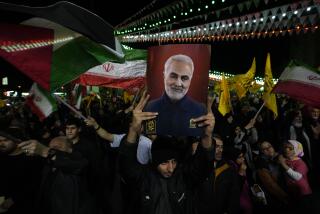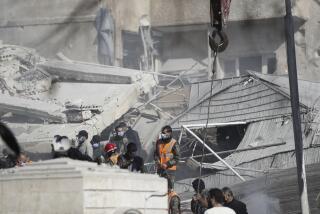Fear, Suspicion Linger After Damascus Attack
DAMASCUS, Syria â Syrians buried their dead and cleared the glass shattered in a shootout, amid fears on Wednesday that the governmentâs tight grip on society might be slipping, allowing armed Islamist radicalism to take root.
The area where a car bomb exploded and a fierce gun battle raged Tuesday night -- a wide, palm-lined boulevard -- was little the worse for wear except for a charred building. Traffic coursed past the embassies, students jammed chic cafes and sidewalk vendors hawked corn on the cob in the diplomatic quarter of Mazza.
âThe U.S. says Syria is a terrorist country, but now weâre the ones under terrorism,â said business student Martin Kardour, 24, as he sipped coffee in a trendy cafe. âEverybody feels thereâs something wrong, the people feel ill at ease. We listen to the news every day. Weâre afraid.â
No group claimed responsibility for the attack that reportedly left four people dead. But the suspicions of analysts and officials focused on Islamist radicals, feeding fears that hard-core Muslims within Syria, radicalized by regional instability and keen to exploit a moment of weakness, may try to destabilize the country.
Although the government broadly condemned the attack as a âterroristâ strike, officials announced no suspects and kept details of the investigation quiet. Two of the gunmen, both young Syrians, were detained, a Syrian source close to the investigation said. The pair was being interrogated Wednesday.
Meanwhile, analysts pointed to the bloodshed in Damascus, Syriaâs capital, along with attacks and terror plots in Jordan, Saudi Arabia and Morocco, as proof that Arab regimes are increasingly vulnerable to violence on their home turf. Pressures for reform are coming from the international community as well as from pro-democracy activists within the Arab world, and the intense combat in Iraq could inspire radicals to take up arms, they said.
âUnfortunately, a lot of these regimes are still trying to act like an earthquake didnât occur and as if things havenât changed,â said Gibran Tueni, editor of the Arab newspaper An Nahar. âThese old-fashioned regimes have been destabilized, and things are moving very fast. If we donât have evolution, weâre going to face a process of revolution.â
In Washington, a State Department spokesman said the U.S. had no information linking the Al Qaeda network to the attack.
âAs the bombings in Madrid, in Riyadh, in Casablanca, in Istanbul -- pick the spot -- have made clear, no state is immune from ... the threat of terrorist attack. And that includes Syria,â Adam Ereli said. Such attacks âshould just be accepted as a fact of life that we live with in the modern world.â
From the Palestinian intifada to the Iraq war, regional events have posed a series of political tests for Syrian President Bashar Assad since he took office after his fatherâs death in 2000. Assad has promised reform, but has continued to jail activists and pressure opponents under a state of emergency.
But this weekâs incident marks the second serious eruption of violence this year. In March, minority Kurds went on a rampage of burning, looting and rioting in northern Syria, drawing a deadly crackdown by the security forces. The ethnic Kurds have long suffered as second-class citizens in Syria, but the prospect of Kurdish autonomy in Iraq has reinvigorated Kurdish aspirations throughout the region.
In Syria, many reformers fret that the fighting will only make change more elusive.
âShocks make the regime stronger and stronger,â said human rights lawyer Tarek Hokaan. âNow they have a justification for putting people in jail. Now they have an excuse for the emergency law.â
At first glance, Syria hardly seems a pressing target for Muslim insurgents. The regime has a reputation for standing in defiant opposition to both Israel and the United States. But enmity between the secular Baath regime and Islamists is bitter and old. In the early 1980s, the elder Assad stamped out the Muslim Brotherhood by killing thousands of his people.
The conflict deepened after Sept. 11, as Syria cooperated closely with the U.S. governmentâs investigations into Al Qaeda, interrogating prisoners and sharing intelligence, officials said. More recently, with the threat of U.S. sanctions dangling over his head, Assad made a peace overture to Syriaâs longtime nemesis, Israel.
âI think Al Qaeda might have in mind that Syria has cooperated with America,â said Mounir Ali, a journalist in London for the official Syrian news agency. âThis [attack] is directed mainly against the diplomatic quarter in Damascus, and they wanted to say they were able to do something there.â
To many here, the idea that fellow Syrians might be responsible for the bombing was unthinkable. Rumors and whispers of conspiracy swirled through the city -- many Syrians blamed Israel, the United States or both.
Hamas leader Khaled Meshaal reportedly has a flat in the neighborhood, conspiracy theorists pointed out.
When Abu Haysim heard the first explosion, he thought an aircraft had broken the sound barrier, and braced for attack. âAmerica is threatening us, Israel is threatening us,â the 67-year-old said, âso thereâs a lot of pressure.â
When the gunfire erupted, he tugged down the shades of the real estate agency where he has answered the phones for 15 years and hid in the dark. Like many of the streetâs residents, he didnât dare put his head out the door to see who was doing the shooting. The bullets were passing âlike flying stars,â he said.
âThese people who are doing this, theyâre terrorists who come to terrorize the people. They have no conscience, no feelings of patriotism,â he said. âNo religion on Earth accepts this. They are the devil themselves.â
Times staff writers John Daniszewski in London and Mary Curtius and Greg Miller in Washington contributed to this report.
More to Read
Sign up for Essential California
The most important California stories and recommendations in your inbox every morning.
You may occasionally receive promotional content from the Los Angeles Times.










